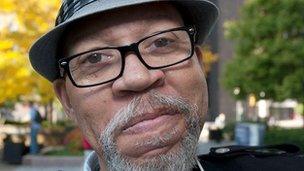Detroit: 'I welcome the bankruptcy'
- Published
Detroit has become the largest US city ever to file for bankruptcy, with $18bn (£12bn; 13.7bn euros) of debt.
Detroit, once a symbol of US industrial power, has faced decades of decline.
The city's problems stem from declining industry. Public services are nearing collapse and about 70,000 properties lie abandoned.
BBC News website readers from Detroit talk about how the news has affected them.
Laura East, Taylor, Michigan

I was born (in 1956) and raised in Detroit. I now live in Taylor city, a suburb about 15 miles from the city.
It breaks my heart to see what has happened to my city. When I was a child, it was a great place to raise a family - quiet neighbourhoods, decent schools, plentiful employment opportunities, and so on.
Now, it is so crime infested that I am afraid to go there. My husband works in Detroit, and I fear for his safety.
I have mixed feeling about the bankruptcy. Part of me feels that maybe it is necessary to address the city's debts. But I am also concerned that many things that made Detroit great in my memories, especially Belle Isle (a island park owned by the city) and the Detroit Institute of Arts will be sold off to private investors in order to liquidate the debt.
The causes of Detroit's problems are more than the unions and political corruption. The decline for me started after the riots of 1967. A lot of people started moving away.
Employment opportunities in Detroit have also been poor for decades. Taxes and revenues received are not enough to pay all of the city's debts.
Detroit can go bankrupt, but unless the citizens of Detroit can gain meaningful employment, I don't see how this bankruptcy will address the problems in the long run.
Gordon Alexander, Detroit

I have lived in Detroit for going on 26 years. Having lived on the east side of the city, I have seen it decline and I have seen it shine in a way that would match any other large city.
The city, though, has been in decline for a number of years now.
I was a former staff photographer for Mayor Dennis Archer, so I saw how the city functioned and saw its weaknesses.
I welcome the bankruptcy so that we can deal with the issues once and for all.
There are sections in the city where the street lights are out and there is no money to repair them.
Public transportation is in bad shape too. There are so few buses in some places that you end up waiting two to three hours for a bus.
I used to be a teacher in a state school. There have been so many cuts, that teachers' pay has halved in some schools.
Like many others I have thought of migrating.
But my hope is that the city will grow again. I still take pride in this city.
I look forward to the city to being a great example of American industry and the American Mid-West values - honest day's work and rewards that are simple, but ones you have worked for.
EJ Knapp, Detroit

The city has suffered from 50 years of mismanagement and has been in a downhill spiral for the last couple of years.
I was born and raised in the city. I moved away in 1981 and I came back in 2011 after I bought a house here.
There are abandoned houses everywhere around me. There are nine of them across my street and two others have burned down.
People have moved away. I guess around two million people used to live here in the 1950s, now there are just over 700,000.
If you want people to move into the city, then you have got to invest in public services such as libraries and public parks like the beautiful Belle Isle.
Detroit will rise again. The bankruptcy will merely make it happen faster.
Detroit is more than statistics and numbers. She's a grand old lady, battered and torn.
There are people here who love her, who have been mending the tatters and patching the holes without the help of a government in chaos.
There is a huge community spirit. Some neighbourhoods have set up associations to look after their areas.
I see Detroit coming back. Young people and investors will realise that it is a great place start a business or buy property.
Ken Lee, Metropolitan Detroit
I was born and raised in the city and I've never been more than 30 minutes from the centre.
In the 1960s the city was glorious and folks from the suburbs used to venture downtown.
But after the race wars in 1967, the non-African Americans started to pull out of the city.
'White flight' left Detroit at the mercy of the officials who were famed for corruption.
Great skyscrapers are empty. The Michigan Central station, a building which could never be duplicated, has been left to decay. The city is littered with beautiful ruins.
Yet, I'm optimistic for future of this city. There's a lot going for it particularly on the cultural front. Things will take some time to change for better.
I suspect it will be at least 25-50 years for Detroit to come back to its glory. Hopefully by then our children can experience a better city.
- Published19 July 2013
- Published19 July 2013
- Published19 July 2013